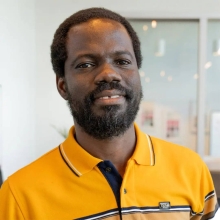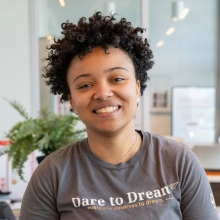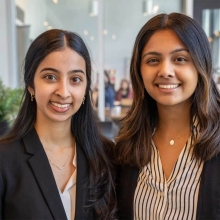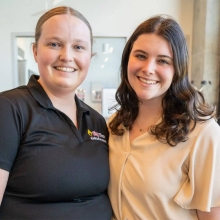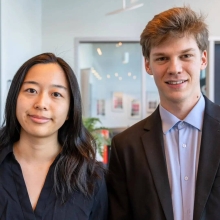
Photos courtesy of the Do Good Institute
Via Maryland Today / By Ruby Siefken ’26
6 Student Teams to Demonstrate How They ‘Do Good’ in Pitch Competition
What do a student-run hackathon, a dance marathon and a youth CPR program have in common? They’re all led by University of Maryland students who believe changing the world doesn’t have to wait until graduation. This year’s Do Good Challenge finalists are tackling big problems with bold ideas—and they can point to lives saved, dollars raised and businesses launched to prove it.
The 14th annual finals will be held Tuesday, with six student-led teams pitching solutions to social issues to a panel of expert judges and a live audience. They’ll compete for a share of $40,000—nearly double last year’s prize money.
Do Good Institute Program Coordinator Catherine Curtis said she never tires of watching students inspire one another.
“The challenge draws students from all different schools, colleges and majors, but they all have a common goal of wanting to make the world a better place,” Curtis said. “This is all about inspiration and celebration even more than it is about competition.”
The Do Good Institute, based in the School of Public Policy, reimagined the two competition tracks this year. The founders track is designed for students who have created an original organization, project or initiative, while the leaders track is for those in leadership or decision-making roles, often as a member of a larger club or outside organization.
Take a look at how finalists from both tracks aim for impact:
What do a student-run hackathon, a dance marathon and a youth CPR program have in common? They’re all led by University of Maryland students who believe changing the world doesn’t have to wait until graduation. This year’s Do Good Challenge finalists are tackling big problems with bold ideas—and they can point to lives saved, dollars raised and businesses launched to prove it.
The 14th annual finals will be held Tuesday, with six student-led teams pitching solutions to social issues to a panel of expert judges and a live audience. They’ll compete for a share of $40,000—nearly double last year’s prize money.
Do Good Institute Program Coordinator Catherine Curtis said she never tires of watching students inspire one another.
“The challenge draws students from all different schools, colleges and majors, but they all have a common goal of wanting to make the world a better place,” Curtis said. “This is all about inspiration and celebration even more than it is about competition.”
The Do Good Institute, based in the School of Public Policy, reimagined the two competition tracks this year. The founders track is designed for students who have created an original organization, project or initiative, while the leaders track is for those in leadership or decision-making roles, often as a member of a larger club or outside organization.
Take a look at how finalists from both tracks aim for impact:
Founder's Track
Black Stars Wellness Initiative (BSWI) teaches health care literacy, emergency preparedness and first aid skills in underserved local and international communities. Since its founding in 2021, BSWI has provided potentially life-saving medical training to more than 2,500 young people in 18 U.S. cities and four more across Ghana. BSWI has saved at least 47 lives through its training programs, including nearly 10,000 CPR, AED and first aid certifications. Chairman and founder Ebenezer Mensah ’26 will represent the organization at this year’s Do Good Challenge.
Dare to Dream is a nonprofit dedicated to empowering minority students and young people in marginalized communities to pursue their entrepreneurial dreams. Through hands-on workshops, mentorship and community initiatives, Dare to Dream gives students skills and resources to create and launch their own businesses. Founded in 2022 by Takiyah Roberts ’25, the organization has supported more than 1,700 young people in the DMV and helped launch more than 20 youth-led businesses.
The Movement Street is an organization dedicated to increasing volunteerism across the United States and a first-time Do Good Challenge finalist. Lyric Amodia MBA ’25 founded it to create sustainable, creative and accessible pathways for individuals to give back to their communities. Since its inception five years ago, it has engaged more than 3,500 volunteers for 845,000 volunteer hours in several locations in Michigan, where she grew up, and across the DMV. The Movement Street offers key volunteering opportunities such as thanksgiving meal donations, street cleanup initiatives and neighborhood gardening as well as donation platforms and charitable merchandise.
“We were established on the belief that individuals should care about communities beyond their own and remain committed to service overtime,” Amodia said. The Movement Street has a 90% retention rate among community volunteers.
Leaders Track
Bitcamp, the largest collegiate hackathon on the East Coast, draws thousands of participants each year to its high-energy, 36-hour showcase of innovation and collaboration. After 10 years on campus, Bitcamp continues to bring students from across the country together to build tech products and explore new skills regardless of coding experience. With a dynamic mix of workshops, mentorship, challenges and community-building activities, Bitcamp is designed to make hacking fun, inclusive and impactful for every skill level. Co-executive Directors Anjali Samavedam and Sharvari Tirodkar, both three-year members of the organization, will represent Bitcamp in its debut appearance at the Do Good Challenge this spring.
"Our goal is just to show that anyone, even if they've never coded a line before in their life, can create something cool and be empowered with the use of tech,” Tirodkar said.
Terp Thon, the largest student-run philanthropic organization in Maryland, rallies support for patients and families fighting pediatric illness and injury across the DMV. Each spring, more than 1,000 students gather for a raucous 8-hour dance marathon—the organization’s signature event. Since 2018, the marathon has raised over $2.5 million to fund pediatric cancer research and treatment at Children’s National Hospital. Through its year-round efforts, Terp Thon raises awareness about pediatric health issues, fosters a sense of community on campus and encourages philanthropy through fun. Executive Director Maddy Bulman ’25 and Internal Director Anna Devoto ’26 will represent Terp Thon at this year’s Do Good Challenge.
UMD Chapter of Food Recovery Network (FRN) is a student-led volunteer organization dedicated to fighting food waste and hunger by recovering surplus food and redirecting it to communities in need. FRN collects excess or unwanted food from dining halls, athletic facilities and catering kitchens for donation to the Christian Life Center in Riverdale, Md., which distributes it to nine local churches and soup kitchens. Founded at UMD in 2011, FRN has grown into a national nonprofit with chapters at colleges and universities across the country. Since its founding, the UMD chapter alone has recovered more than 155,000 pounds of food—equivalent to 130,000 meals and worth more than $300,000. Kyle Zibell ‘26 and Sophia Li ‘26 will present FRN’s recent successes at this year’s competition.

